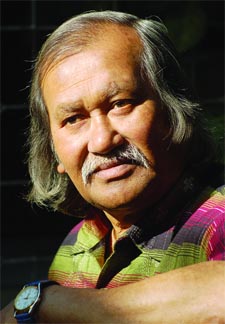Rafiq Azad facts for kids
Quick facts for kids
Rafiq Azad
|
|
|---|---|
| রফিক আজাদ | |
 |
|
| Born |
Rafiqul Islam Khan
February 14, 1941 Tangail, Bengal Presidency, British India
|
| Died | March 12, 2016 (aged 75) Dhaka, Bangladesh
|
| Nationality | Bangladeshi |
| Alma mater | University of Dhaka |
| Occupation | Poet, literary editor |
| Years active | 1973–2016 |
| Known for | Patriotic, romantic and protest poems |
|
Notable work
|
Chuniya Amar Arcadia |
| Movement | Realism, Modernism, Romanticism |
| Awards | Bangla Academy Award, Ekushey Padak |
Rafiq Azad (born Rafiqul Islam Khan) was a famous poet, editor, and writer from Bangladesh. He was born on February 14, 1941, and passed away on March 12, 2016. He wrote many poems, including patriotic, romantic, and protest poems.
One of his most famous poems is "Bhaat De Haramjada" (which means "Give me food, bastard"). He wrote this poem during a difficult time in Bangladesh, the famine of 1974. This poem showed how much people were suffering from hunger.
Rafiq Azad was also a brave freedom fighter. He fought against the Pakistani forces during the Liberation War in 1971. For his courage, he received the "Notable Freedom Fighter Award" in 1997. He also won important awards for his writing, like the Bangla Academy Literary Award in 1984 and the Ekushey Padak in 2013. These awards recognized his great contributions to the Bangla language and its literature.
Contents
Early Life and Education
Rafiq Azad was born on February 14, 1941. His birthplace was a small village called Guni in the Tangail district of Bangladesh. He was the youngest of three children in his family. His parents were Salimuddin Khan and Rabeya Khan.
He studied Bengali literature at the University of Dhaka. He earned his first degree in 1965 and his master's degree in 1967.
Career as a Writer
Rafiq Azad was known as one of the most active young poets after the Liberation War. He wrote a total of 45 books, including his own life story.
His first book of poems, Ashombhober Paye, came out in 1973. He liked to try new ways of writing and using language in his poems. He often used a style that explored dreams and imagination.
What He Wrote About
Rafiq Azad called himself a "lover of humans, nature, and romance." In his poems, he wrote about many different things. He explored themes like love, romance, and the beauty of nature. He also wrote about serious topics like poverty, suffering, and unfairness. His poems often showed what life was like in both cities and villages.
Many of his love poems became very popular. Poems like ‘He Doroja’ and ‘Bhalobashar Shonga’ (meaning "Definition of Love") have been used in movies and TV shows in Bangladesh.
The Famous Poem
He became widely known when his poem "Bhaat De Haramjada" was published in 1974. At that time, Bangladesh was facing a terrible famine. The poem spoke about the deep hunger people felt. It said, "Give me food, or I will eat your map, your country!" This poem showed how desperate people were. It questioned if a newly free country could not even feed its people.
The poem caused a lot of discussion. Some people in the government thought it was a strong criticism. But many readers saw it as a brave and honest cry for help. Rafiq Azad later explained that his poem was part of a long tradition of powerful Bengali writing. He said it was not meant to be against the government.
Professional Life
Rafiq Azad had many different jobs during his 50-year career. He started teaching at Kagmari College in Tangail in the late 1960s.
Fighting for Freedom
The year 1971 changed his life forever. When the Pakistani military attacked on March 25th, Rafiq Azad joined the 'Kaderia Bahini'. This was a group of civilian fighters led by Kader Siddique. He fought against the Pakistani army in the Liberation War. He received weapons and supplies to help in the fight for his country's freedom.
Working in Literature
After the war, he joined Bangla Academy in 1972. He worked there until 1984 as the main editor of Uttaradhikar, a monthly magazine. He also edited Robbaar, another popular weekly magazine in the 1980s.
For many years, Rafiq Azad was the director of the National Book Center of Bangladesh. He also worked briefly as a manager at the Bangladesh Jute Mills Corporation. In 1995, he returned to Bangla Academy to help with the 'Young Writers Project'. He taught young writers about poetry. Later, he became a visiting professor of literature at Jahangirnagar University. In his later years, he worked for a daily newspaper called Amader Shomoy.
Personal Life and Passing
Rafiq Azad married Adila Bakul in 1969. They had four children: Lopa, Rahul, Deepita, and Rajeev. They separated in 1983. Later that year, he married Dilara Hafiz. They had two sons, Ovinna and Obyoy.
In January 2016, Rafiq Azad had a stroke. He was in the hospital for almost eight weeks. He passed away on March 12, 2016, in Dhaka. He was buried in the Martyred Intellectuals' Cemetery in Mirpur.
Books
- Asombhaber Payae
- Semabadha Jalae, Simito Shobuja
- Ekjibona
- Haturier Nichae Jibon
- Porikirno Panchala Amer Swadesh
- Khub Bashi Durea Nay
- Khamakaro Bahoman Hay Udar Omiyo Batas
- Karo Ashuro Pat
- Pagolar Thekay Pramikar Chiti
- Apar Arannya
- Moulobir Mon Bholo Nay
- Priyo Shareegulo
- Poems on Love Environment and Other Difficulties
Awards
- Kobitalap Award (1979)
- Alaol Literary Award (1981)
- Bangla Academy Literary Award (1984)
- Suhreed Literary Award (1989)
- Poet Ahsan Habib Award (1991)
- Poet Hasan Hafizur Rahman Award (1996)
- Notable Freedom Fighter Award (1997)
- Ekushey Padak (2013)
 | John T. Biggers |
 | Thomas Blackshear |
 | Mark Bradford |
 | Beverly Buchanan |

